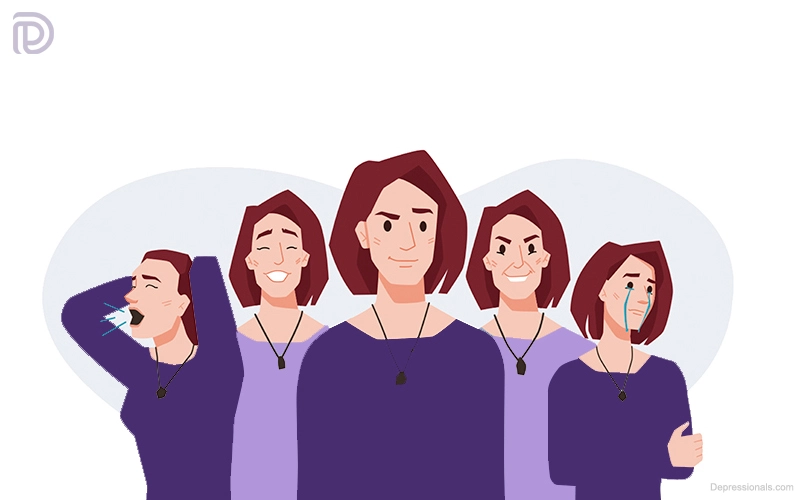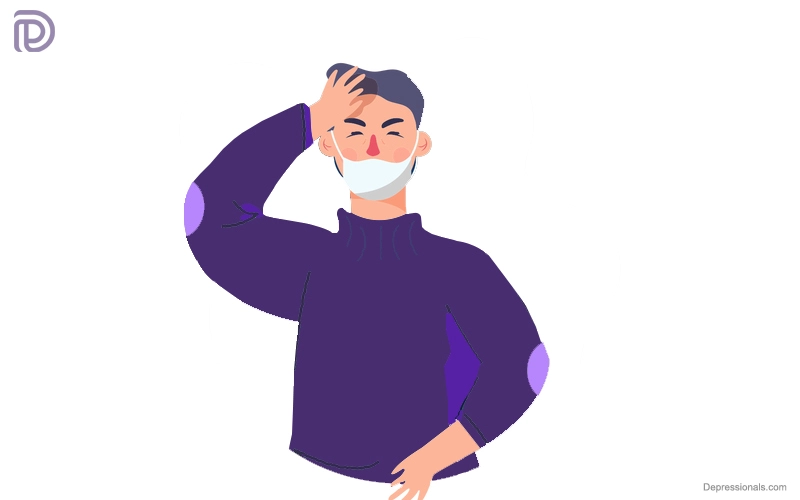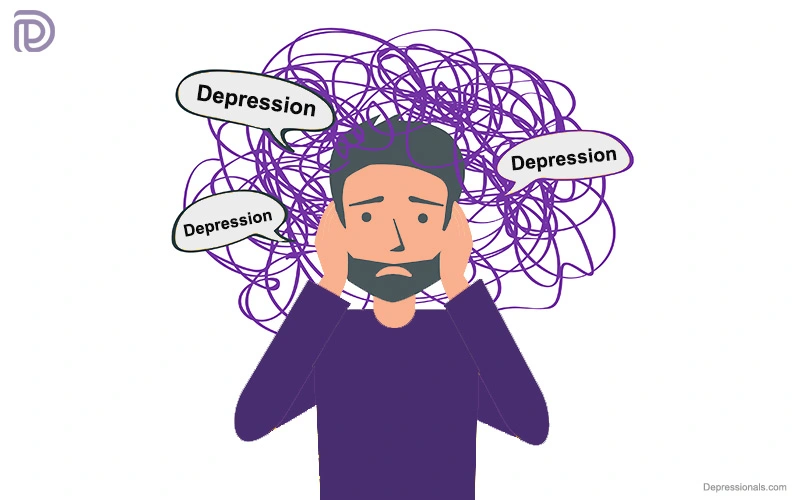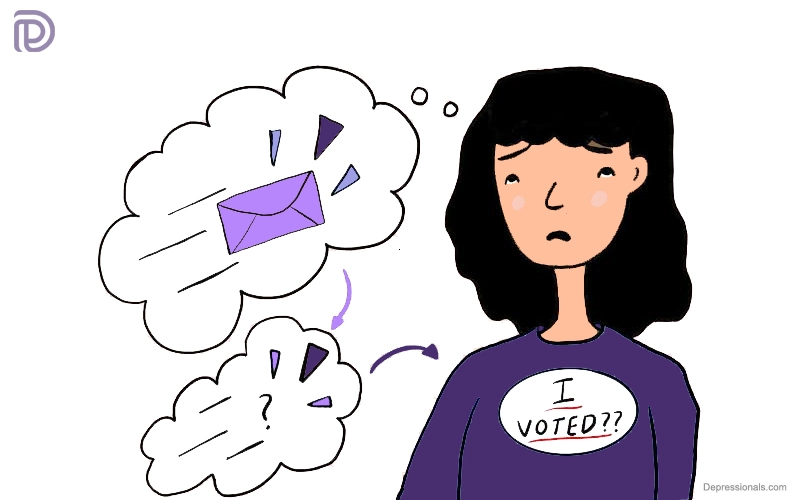Bipolar Disorder also known as Manic depression, affects some people during periods of extreme high emotions (mania & hypomania) and low emotions (depression).
Bipolar Depression can make you feel hopeless and force you to lose interest in the things you used to enjoy. During the mood swings, it may give you a feeling of euphoria, energetic and irritability when your mood changes to mania or hypomania (less major than mania).
People with mood swings may find it difficult to sleep, be energetic, behave appropriately, judgment and stay focused to think clearly. Feelings of mood swings may occur on rare occasions or more than once a year. During an episode, many people will experience different emotional symptoms. However, some will not.
However, bipolar depression is a long-lasting condition but you can control your mood changes with the right treatment and therapy. Psychotherapy and medications are usually used to treat bipolar depression in the majority of cases.
Related: Psychotic Depression
Bipolar depression facts
Idiopathic psychiatric disorders do not appear to be rare. About 5 million people in the United States were diagnosed with idiopathic psychiatric disorders in 2015, a 2.8 percent rate. On average, people who suffer from bipolar illness begin experiencing symptoms at 25 years of age.
Mental illness like bipolar causes depression which usually lasts for up to two weeks. Several days or weeks can pass without a break in a high-level (manic) episode of bipolar disorder.
Most people feel mood swings only rarely, while others might experience them many times a year. Some people feel this disorder as follows.
Symptoms of bipolar depression
A person suffering from this disease will typically suffer from three conditions: hypomanic, manic and depressive symptoms.
Bipolar sufferers may feel emotional highs while experiencing mania. It can make you feel enthusiastic, impulsive, euphoric and energetic.
When manic episodes occur, they can also do things like:
- Unprotected intimate moments
- Spending sprees
- Drug use
People suffering from bipolar disorder are usually afflicted with hypomania. The symptoms of hypomania are similar to mania, but they are less severe. However, unlike mania, hypomania will not result in any trouble at school, work or in any relationships. Still, people suffering from hypomania experience mood changes.
When you are depressed, you may experience:
- Deep sadness
- Hopelessness
- Loss of energy
- Loss of interest in your passion
- Sleeping too much or too little
- Suicidal thoughts
- Feel a lack of enjoyment of anything you do
- Find it hard to concentrate and remember things
It is although not uncommon, however, has many side effects that can make it hard to diagnose.
Read: Work Depression
Bipolar disorder symptoms in women

Bipolar disorder is diagnosed in equally high numbers among men and women. While the main signs of bipolar depression may in females differ between genders, there is one thing that they may have in common. Female sufferers, it may:
- Be diagnosed in her early 20s or 30s
- May suffer a milder form of mania
- Have depression more than manic episodes
- Have mania and depression four or more times in a year. This is called rapid cycling
- Experience some conditions such as thyroid disorders, anxiety disorders, migraines, obesity and depression
- Have an increased lifetime risk of alcoholism
Additionally, women who suffer from bipolar disorder may relapse more frequently. Symptoms are typically caused by hormonal changes related to pregnancy, menopause or menstruation. Females who feel they may suffer from bipolar disorder need to gather the facts.
Related: Postpartum Depression
Bipolar disorder symptoms in men
Bipolar disorder affects both men and women in the same way. In contrast to women, men may experience symptoms in a different way. Male sufferers, it may:
- Diagnosed at an earlier age
- Suffer from more severe situations, mostly manic episodes
- Are a substance abuser
- Act out when experiencing manic episodes
It has been observed that men with bipolar disorder seek medical care less often than women do. Furthermore, they’re more likely to commit suicide.
Bipolar disorder types
Bipolar disorder occurs in three main types are Bipolar I, Bipolar II and Cyclothymia. A person’s mood and behavior can fluctuate without warning throughout the day, making life problematic in the long run. Women and men are equally affected by this type of bipolar disorder.
Bipolar I
Bipolar I disorder patient experiences at least one manic episode. It’s possible to have major depression or hypomania during the manic episode and afterward. Both men and women suffer from this bipolar disorder.
Bipolar II
A major depressive episode that lasts longer than two weeks occurs in individuals with this type of bipolar depression. They also suffer from a hypomanic episode lasting about 4 days. Women seem to be more likely to have this bipolar II disorder.
Cyclothymia
Those suffering from cyclothymia experience episodes of depression and hypomania. Symptoms of manic and depressive episodes are less intense than those associated with bipolar disorder I or II.
It’s common for people with this condition to have their moods stable for only four to six weeks at a time. The type of bipolar disorder you have will be described by your doctor during your diagnosis.
Related: 4 Major Ways Depression Effects on Brain
Bipolar disorder in children
A child suffering from bipolar disorder may be difficult to diagnose. Children tend to display different differences and symptoms than adults when it comes to bipolar disorder.
A doctor may not be able to diagnose the disorder in children by the same standards used to diagnose the disorder in adults.
A wide range of symptoms from bipolar disorder occurs in children. Some of these symptoms overlap with ADHD symptoms.
Although, the condition has been recognized among children in recent decades by mental health professionals and doctors. An accurate diagnosis may accelerate treatment for children, but the process may take several weeks or months.
Your child may require special treatment from a trained professional (Child Specialist) who knows how to treat mental health issues in children.
Just as adults, bipolar disorder affects the mood of children. Their emotions can seem really happy and their behavior can show signs of excitement. After these periods, depression occurs.
While every child experiences mood swings at times, bipolar disorder produces very pronounced mood changes. Children’s mood swings are often more extreme than typical mood changes.
Related: Teen Depression
Manic symptoms in children
Children with bipolar disorder may experience symptoms like:
- Overly happy and acting silly
- Talking fast
- Rapidly changing topics
- Not being able to focus or concentrate
- Trying to do risky things
- Risky activities or experiment with risky behaviors
- Short tempers that cause sudden outbursts of anger
- Insomnia and tired after sleep deprivation
Depressive symptoms in children
Children with bipolar disorder may experience a depressive episode that includes:
- Acting very sad or moping around
- Sleeping too little or oversleeping
- Being unable to perform normal activities
- Not seem to care about anything
- Complaint of being unwell, including frequent stomachaches and headaches
- Feeling worthless or guilty
- Overeating or eating too little
- Suicidal thoughts
Other diagnoses
You may observe behaviors that arise as a result of other conditions in your child. Children with bipolar disorder can develop ADHD and other behavior disorders.
You should work with your child’s doctor to document any unusual behaviors your child is displaying, which can be used at a doctor’s appointment to facilitate a diagnosis.
Correctly diagnosing your child can provide your doctor with information on treatments that will help him or her live a healthy life.
Related: Postnatal Depression
Bipolar disorder in teens
Almost every parent of a teenager experiences behavior containing a significant amount of anxiety. Even the most well-behaved teenager can act disturbed or overly emotional sometimes because of the hormone shifts and life changes that come with puberty.
Teens who are in a negative mood during certain stages of life may also have a more serious mood disorder like bipolar disorder.
The diagnosis of bipolar disorder most commonly occurs between the ages of late teens and early adulthood. Manic episodes in teenagers most commonly include:
- Being extremely happy
- Misbehaving or acting out
- Participating in risky activities
- Abusing substances
- A more intense desire for intimate moments
- Becoming intimate overly active
- Sleep difficulties, but which do not indicate fatigue or signs of being tired
- Being extremely short-tempered
- Getting distracted easily or not able to focus
Depressive episodes in teenagers most commonly include:
- Getting too much sleep or not enough sleep
- Overeating or eating too little
- Showing little excitement
- Feeling very gloomy
- Refusing to participate in activities and socialize with friends
- Thinking about suicide and death
A person can live a healthy life if they are diagnosed with bipolar disorder and start treatment on time.
Read: Loneliness and Depression
Depression and bipolar disorder
There are two extremes in bipolar disorder that are up and down. Bipolar disorders are diagnosed when person experiences episodes of mania or hypomania.
Most people feel “Up” during this phase of the condition. When your mood is up, you may feel highly energetic and easily temperamental.
In some cases, bipolar patients may also experience a major depressive disorder, also known as a “down” mood: You will likely feel sad, unmotivated, and lethargic when experiencing a “down” change in mood.
Although some people with this symptom feel depressed, not everyone with bipolar disorder does. For example, some people can have a normal mood after their manic episode is treated, but they feel like they are depressed because the manic episode produced a high.
Depressive symptoms can be a sign of bipolar disorder, However, bipolar disorder is not the same as depression. People who have bipolar disorder may have highs and lows, but people who suffer from depression have always “down” moods and emotions.
Related: Situational Depression
Causes of bipolar disorder
Researchers and doctors are a little unsure about the causes of bipolar disorder, but it is one of the most common mental health disorders. The exact cause of the condition is unclear since some people develop it while others do not.
Bipolar disorder can be caused by:
Genetics
Your chances of developing bipolar disorder are higher if your parent or sibling has this mental disorder (see below). However, it’s important to remember that most people who come from families with bipolar depression do not develop it themselves.
Your brain
You can reduce your risk for the disease by changing your brain structure. You may be at more risk if you have abnormalities of your brain structure or functions.
Environmental factors
The fact that your body can have bipolar disorders has more to do with what’s in your body than with what’s out there. Other factors may play a role, too. This can include the following factors:
- Extreme stress
- Traumatic experiences
- Physical illness
Bipolar disorder may be caused by any of these factors. However, it seems more likely that there are several factors contributing to disease development.
Read: Melancholic Depression
Is bipolar disorder inherited?
Mental illnesses, such as bipolar disorder, can be passed from one generation to the next. Genetic research has found a strong genetic connection in people with this disorder. A person who has a person with the illness has a four to sixfold increased risk of also having them.
Yet this may not mean that every member of the family will develop the disorder. Moreover, not all people with bipolar disorder are affected by the disease because of their families. Sometimes, it occurs by their own circumstances.
Even so, genetics still seem to have a significant effect on the arises of bipolar disorder. If you are experiencing this mental illness in you or in your family then ask your doctor and go for screening because it is the best treatment to get recover ASAP.
Bipolar disorder diagnosis
Symptoms of bipolar disorder often include manic episodes or a combination of both (depressive and manic episodes), This may include an episode of major depression, but maybe without it.
There must be at least one episode of hypomania and one major depressive episode for bipolar II to be diagnosed. A manic episode can be diagnosed if you experience symptoms that last more than at least a week or even may require you to be hospitalized.
The symptoms must last most of the day, almost daily during this time. Those experiencing major depression must have to undergo an episode for at least two weeks.
Mood swings can make this disorder difficult to diagnose because mood swings can vary from person to person.
It is even more difficult to diagnose in adolescents and children. The mood, behavior, and energy levels of children in this age group can change more often.
If bipolar disorder is untreated then the frequency and severity of episodes may increase, and they may also become more severe. It is possible to lead a healthy and productive life if you receive treatment. Thus, diagnosis is crucial.
Read: Endogenous Depression
Bipolar depression test
The diagnosis of bipolar disorder doesn’t come from one single test result. However, many tests and exams will be performed by your doctor. The following are some examples:
Physical exam
A physical exam will be conducted by your doctor. Your doctor may also take urine or blood tests to find other possible reasons for your symptoms.
Mental health analysis
Mental health professionals such as a psychiatrist or psychologist may be referred to you by your doctor. They diagnose and treat mental illnesses such as bipolar disorder. At this visit, you will be examined mentally and screened for signs of the disorder.
Read: Biology of Depression
Mood journal
Your doctor may ask you to chart your mood changes if he or she suspects your behavior changes may be a cause of a mood disorder like bipolar.
Keeping a journal is the easiest way to keep track of your feelings and how long the feelings last. It is also advisable to keep a record of your eating and sleeping patterns.
Diagnostic criteria
An outline of symptoms for various mental health disorders can be found in the Diagnostic and Statistical Manual of Mental Disorders (DSM). These symptoms can be used by physicians to confirm bipolar diagnoses.
In addition to these tools and tests, your doctor may use others to diagnose bipolar depression.
Bipolar disorder treatments

There are many treatments available that can help you to cure bipolar disorder. This includes counseling, lifestyle changes, and medications. Some people find that natural remedies help as well.
Prescription medications
The following bipolar depression medications may be recommended:
- lithium (Lithobid) and other mood stabilizers
- Drugs like olanzapine (Zyprexa) could be helpful in treating patients
- Symbyax, an antidepressant-an antipsychotic
- Use of benzodiazepines as anti-anxiety medications such as alprazolam (Xanax)
Related: How to Get Out of a Depressive Episode
Psychotherapy
The following Psychotherapy may be recommended:
Cognitive behavioral therapy
Cognitive-behavioral therapy CBT is a category of talk therapy. A therapist and you discuss the treatment of your mental illness.
The purpose of CBT is to help you get to know your thinking patterns. You can also get positive coping strategies from them as well.
Psychoeducation
The goal of psychoeducation is to educate you, your loved ones, and family members about mental illness. Being aware of the symptoms of bipolar disorder will help you and others to easily manage it.
Interpersonal and social rhythm therapy
Interpersonal and Social Rhythm Therapy (ISRT) helps you manage your disorder by balancing your everyday activities, such as eating, exercising, and sleeping.
Must read: How to Help Someone with Depression
Alternative treatments
Additional treatment options are:
- Electroconvulsive Therapy (ECT)
- Sleep Medications
- Supplements
- Acupuncture
Lifestyle changes
There are a few simple things you can do now to treat your disease better:
- Sleep and eat in a routine
- Learn the signs of mood swings
- Support your treatment plans by asking for help from a friend or relative
- You should seek the advice of a doctor or mental health professional
Depressive symptoms caused by bipolar can be relieved by making other lifestyle changes.
Related: Postnatal Depression
Natural remedies for bipolar disorder
There are natural treatments that may help with bipolar disease. But, it is important to keep in mind that you consult your doctor before using any of these remedies. The medications you are taking could be affected by these treatments.
Here are supplements and herbs that may help you treat bipolar illness and stabilize your mood:
Fish oil
According to a 2013 study, individuals who eat more fish and fish oil may have a lower risk of developing bipolar depression. Eating fish will help you get the essential oil naturally or you can use OTC supplements.
Rhodiola rosea
This research indicates a possible benefit for depression in moderate cases from this plant. Bipolar disorder may be managed by this medication in treating depressive symptoms.
S-adenosylmethionine (SAMe)
The SAMe supplement provides amino acids. Researchers have found that it can lessen the symptoms of mood disorders and major depression.
There are some vitamins and minerals that may also decrease the symptoms of mental illness.
How to deal with bipolar depression
The good news is, you are not alone there are millions of people affected by bipolar disorder. More than 60 million people suffer around the world.
Educating yourself and your family about bipolar illness is one of the best things you can do. You can find a lot of information online. For example, you can search for treatment by ZIP code with SAMHSA’s behavioral health treatment services locator.
More resources are available at the National Institute of Mental Health’s website.
Seek help from a doctor if you suspect you are suffering from bipolar disorder. Your support and understanding are essential if you believe someone close to you has this mental illness, or if you suspect they might.
Please encourage them to make an appointment with a doctor if they are experiencing any symptoms.
People suffering from depressive episodes may think about killing themselves. If there is any talk about suicide, take it seriously. If you came to know that someone might harm themselves or hurt someone else:
- Call your local emergency number.
- Keep a close eye on that person until help arrives or don’t leave alone
- Remove anything that can cause harm, including firearms, medications, knives and other items.
- Just listen, but don’t argue, threaten, judge or yell.
Get help from a crisis or suicide prevention hotline if you or someone you know is trying to commit suicide. The (National Suicide Prevention of US) Lifeline number is 800-273-8255
Related: How to Overcome Depression






I have been checking out a few of your stories and it’s pretty good stuff. I will definitely bookmark your website.
These kind of post are always inspiring and I prefer to check out quality content so I happy to finally find many excellent point here in the post, writing is simply great, thank you for the post
I have read some just right stuff here. Certainly price bookmarking for revisiting. I wonder how a lot attempt you put to make any such great informative site.